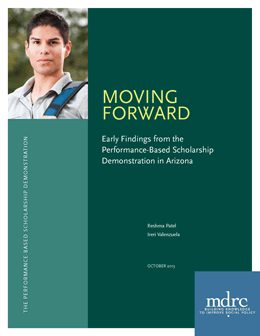Moving Forward
Early Findings from the Performance-Based Scholarship Demonstration in Arizona

While postsecondary completion rates are a concern among many student populations across the country, college graduation rates for Latino students, especially Latino male students, are even lower than the national average. Low-income Latino men face many barriers to postsecondary success, including both financial and personal obstacles. This report presents findings from a study of performance-based scholarships paired with a robust set of student services designed to help low-income Latino men succeed at Pima Community College in Tucson, Arizona. Students who were eligible for the Adelante Performance Award Program could receive up to $4,500 in total over three semesters. Payments were contingent on their meeting academic benchmarks throughout the semester and participating in student support services such as advising, tutoring, and workshops.
The program in Arizona is one of six being studied as part of the Performance-Based Scholarship Demonstration. Each program employs a random assignment research design to test an alternative incentive structure and is intended to serve a different target population. The program at Pima was designed with three main goals in mind: first, to help make college more affordable to low-income students; second, to structure scholarship payments to provide an incentive for good academic progress; and third, to encourage and directly reward participation in student services. The program was funded by a consortium of private foundations and operated from the fall of 2010 through the fall of 2012. This report provides analysis over two semesters of follow-up and suggests that:
- Program group students participated at high rates in the support services offered. Attendance was high at the program orientations, advising sessions, tutoring services, and workshops.
- The program led to a net increase in financial aid and allowed some students to reduce their dependence on loans. Over their first two semesters with the program, students in the program group received around $1,230 more in total financial aid ($1,500 more in Adelante scholarship awards, $240 less in loans, and $80 less in grant dollars apart from Pell Grants and Adelante).
- The program had a small but positive effect on retention. Students’ second semester in the program saw a small, 4.6 percentage-point increase in registration (a 6 percent increase over a control group registration rate of 74.0 percent).
- The program increased full-time enrollment in students’ second semester. In their second semester in the program, students in the program group were 13.2 percentage points more likely to enroll full time compared with a control group mean of 48.8 percent (a 27 percent increase).
- The program increased the number of credits earned. Students in the program group earned almost two full credits more than those in the control group over the first year of the program.
A final report will be published in 2014 that will include findings from students’ third and final semester in the Adelante Program.







